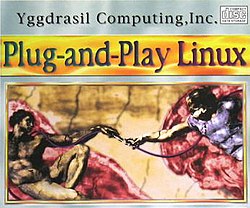Yggdrasil Linux
 |
|
| Developer | Yggdrasil |
|---|---|
| OS family | Unix-like |
| Working state | Obsolete |
| Source model | Open source |
| Initial release | 8 December 1992 |
| Kernel type | Monolithic Linux kernel |
| License | Various |
Yggdrasil Linux/GNU/X, or LGX (pronounced igg-drah-sill), was an early Linux distribution developed by Yggdrasil Computing, Incorporated, a company founded by Adam J. Richter in Berkeley, California.
Yggdrasil was the first company to create a live CD Linux distribution. Yggdrasil Linux described itself as a "Plug-and-Play" Linux distribution, automatically configuring itself for the hardware.
The last release of Yggdrasil was in 1995.
Yggdrasil is the World Tree of Norse mythology. The name was chosen because Yggdrasil took disparate pieces of software and assembled them into a complete product. Yggdrasil's company motto was "Free Software For The Rest of Us".
Yggdrasil was compliant with the Unix Filesystem Hierarchy Standard.
Yggdrasil announced their ‘bootable Linux/GNU/X-based UNIX(R) clone for PC compatibles’ on 24 November 1992 and made the first release on 8 December 1992. This alpha release contained the 0.98.1 version of the Linux kernel, the v11r5 version of the X Window System supporting up to 1024x768 with 256 colours, various GNU utilities such as their C/C++ compiler, the GNU debugger, bison, flex, and make, TeX, groff, Ghostscript, the elvis and Emacs editors, and various other software. Yggdrasil's alpha release required a 386 computer with 8MB RAM and 100MB hard disk. The alpha release was missing some of the source code of some of the packages, such as elvis.
A beta release was made on 18 February 1993. The beta's cost was US$60. LGX's beta release in 1993 contained the 0.99.5 version of the Linux kernel, along with other software from GNU and X. By 22 August 1993, the Yggdrasil company had sold over 3100 copies of the LGX beta distribution.
...
Wikipedia
